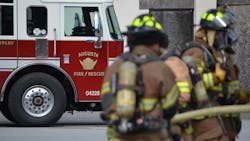Report Outlines Issues at GA Fire Department, Calls for Changes
By Susan McCord
Source The Augusta Chronicle, Ga.
An independent study of the Augusta Fire Department detailed numerous deficiencies in the department but stopped short of recommending a change in leadership.
Obtained by The Augusta Chronicle, the study—of management and employee relations—portrayed a department in which chain of command is "nonexistent," policies are ignored or applied inconsistently and morale extremely low.
The Augusta Commission agreed in July to spend up to $25,000 on a "needs assessment" after receiving numerous complaints, mountains of data and demands for Fire Chief Chris James to resign from Augusta Firefighters Association Local 3357.
The study, done by McGrath Consulting Group, faulted the association for going public with its concerns and recommended commissioners stop getting involved in employee complaints, but didn't speak to communications between commissioners and the chief.
The study said employee complaints to immediate supervisors "fell on deaf ears," then worked their way to the top of the organizational chart to the chief, who provided "still no response and/or action on the issue."
James told the consultants he did not bypass the chart to intervene in disciplinary matters, but the statement was "widely disputed" among those—more than 100—who were surveyed, the study said.
The chief does issue discipline far down the chain and "has often usurped officers' judgment," both in ordering and rescinding discipline, it said.
James did not return a message seeking comment.
The study made several recommendations, ranking those most needed as Priority 1.
It said James needs to give a "state of the department" talk addressing "critical issues that are causing the dysfunction" and how to fix them. Also vital, it said, is to review and clarify job descriptions to define what ranks are responsible for and held accountable for what.
Ultimately, "department problem-solving is the ultimate responsibility of the department head," it said.
The survey found staff expressed "considerable displeasure" when James added two ambulances, bringing the department fleet to three, despite not training firefighters to use them.
Ninety percent believed they could be assigned to an ambulance "with no formal training as to its operations," and some said an ambulance training policy "is not followed or does not exist."
Staff seem to be "randomly transferred from fire apparatus with no discussion" to EMS, while "whatever reasoning for the decisions made by the fire chief is not being shared within the organization."
Seventy percent of those surveyed said they signed up to fight fires and had no interest in EMS, but this is unrealistic, the study said. Nationwide, EMS calls are steadily replacing fire calls and all staff should be involved in EMS, it said. More than half of the department's 23,045 incidents in 2019 were emergency medical.
Of lower priority is Augusta getting control of where its ambulances are used, rather than relying on dispatch by private provider Gold Cross EMS, it said.
The department's Insurance Services Office top ranking of "1" shows an "exemplary" suppression program, but its guarantees of water supply, equipment, staff numbers and training hours do not account for problems beyond the ability to fight fires, it said.
The study recommended an accreditation by the Center for Public Safety Excellence as a better, more accurate evaluation of a department.
With Georgia one of 28 right-to-work states in which employees can't be forced to join unions, Augusta's relationship with the Augusta Professional Firefighters Association Local 3357 is unclear.
While the commission announced it does not recognize the group, the city continues to try to work with the union on issues, the study said.
Among the study's recommendations are assigning a human resources professional to the department to assist with compliance issues, recruiting and planning, but reporting to the city HR department. Another needed cost is to have an independent audit done of personnel policies and procedures.
Both are Priority 1, as are a review of resignations and an overhaul of the department's mandatory overtime policy, a source of widespread dissension, it said. Turnover was 15.4% last year, well above the fire industry standard of less than 10%.
Also in need of review was the department's salary continuation policy, which give a firefighter leave with pay up to 270 days after an injury.
Despite complaints and concerns, "the vast majority indicated they liked the chief," the study said. "But being classified as a nice guy has nothing to do with being a good leader."
Adaptive change—defining problems and developing solutions—is needed, it said.
"Does the current leadership of the fire department desire to resolve them? Is the current leadership capable of resolving the issues?" the study asked.
In addition, "the city must consider not only whether the fire chief is capable of change, but are the city administrator and commissioners willing to make the changes necessary to support the department," it said.
———
©2020 The Augusta Chronicle (Augusta, Ga.)
Visit The Augusta Chronicle (Augusta, Ga.) at chronicle.augusta.com
Distributed by Tribune Content Agency, LLC.






